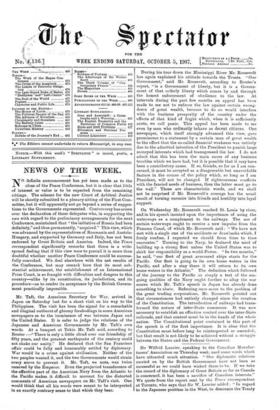On Wednesday Mr. Roosevelt reached St. Louis by river, and
in his speech insisted upon the importance of using the waterways as a complement to the railways. The use of certain waterways ought to receive a new impulse from the Panama Canal, of which Mr. Roosevelt said : " We have not met with a single one of the accidents or drawbacks which, I freely confess, I expected we should from time to time encounter." Turning to the Navy, he declared the need of building up a strong fleet unless the United States was to shirk her responsibility as a world-Power. " In two months," he said, " our fleet of great armoured ships starts for the Pacific. Our fleet is going to its own home waters in the Pacific, and after a stay there it will return to its own home waters in the Atlantic." The definition which followed of the journey to the Pacific as simply a test of the sea- going qualities of the Navy ought further to allay the war scares which Mr. Taft's speech in Japan has already done something to abate. Referring once more to the problem of the great trading corporations, Mr. Roosevelt pointed out that circumstances had entirely changed since the creation of the Constitution. The introduction of railways had trans- formed the nature of inter-State commerce. It was now necessary to establish an effective control over the inter-State railroads, and that control must be in the hands of the whole nation. The Constitutional point contained in this part of the speech is of the first importance. It is clear that the Constitution must before long be reinterpreted or amended; but that result is not likely to be achieved without a struggle between the States and the Federal Government.






























































 Previous page
Previous page